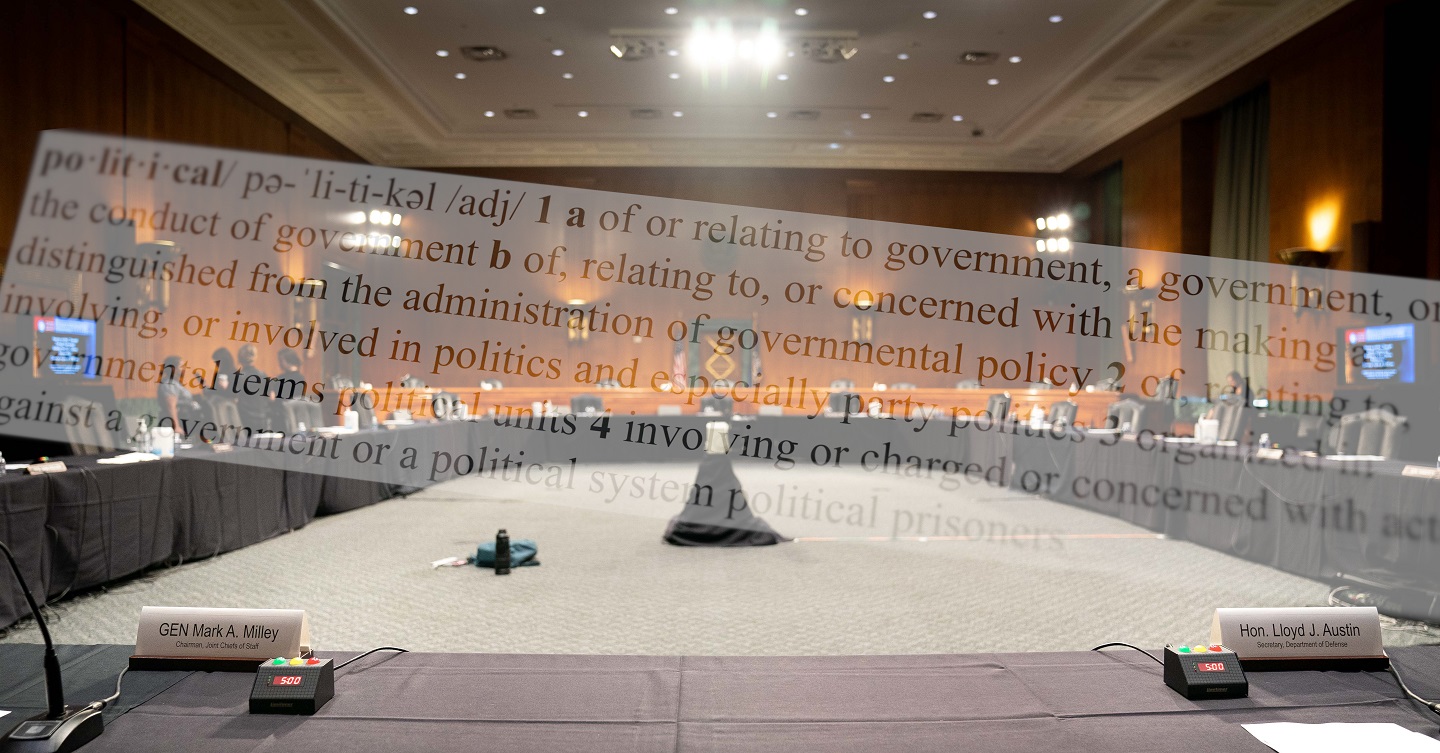
As part of our ongoing collaboration between A BETTER PEACE and the Army War College Civil-Military Relations Center, Celestino Perez joins podcast editor Ron Granieri for a wide-ranging discussion of civil-military relations. Tino notes that words like politics and partisan can have many different meanings. He argues that conversations and debates on the proper role and rules for military engagement with society would be more fruitful, if participants recognize these potential differences. Acknowledging these subtle differences is the first step toward better dialogue and understanding of this complex issue.
“You keep using that word. I do not think it means what you think it means.”
– Inigo Montoya, The Princess Bride (1987)
Podcast: Download
Subscribe: Apple Podcasts | Spotify | Amazon Music | Android | Pandora | iHeartRadio | Blubrry | Podchaser | Podcast Index | TuneIn | Deezer | Youtube Music | RSS | Subscribe to A Better Peace: The War Room Podcast
Celestino Perez is an Associate Professor at the U.S. Army War College. He serves as the Chair of Executive and Strategic Leadership and as the Director of the Carlisle Scholars Program. Tino teaches policy, strategy, civil and interstate wars, and military ethics. Trained as a political theorist, he has published in Armed Forces and Society, Peace Review, Journal of Military Ethics, and Perspectives on Politics, as well as professional pieces in Joint Force Quarterly, Military Review, Strategy Bridge, and War on the Rocks.
Ron Granieri is Professor of History at the U.S. Army War College and the Editor of A BETTER PEACE.
The views expressed in this presentation are those of the speakers and do not necessarily reflect those of the U.S. Army War College, U.S. Army, or Department of Defense.
Photo Description: Review of the FY 2022 Department of Defense Budget Request before the U.S. Senate Appropriations Committee
Photo Credit: MC1 Carlos M. Vazquez II, U.S. Navy





A possible starting point for a discussion of whether — and how — US/Western, and/or other militaries, can be, and indeed should be, expected to remain “apolitical:”
During the Old Cold War of yesterday, (a) the greatest threat to a country’s traditional social values, beliefs and institutions, this was (b) the threat posed to same by communists seeking to achieve communist-based “revolutionary change” — both in their own homelands — and indeed elsewhere throughout the world. However,
Both before the Old Cold War of yesterday — and again after it — the greatest threat to a country’s traditional social values, beliefs and institutions, this was then — and again now is — the threat to same that is posed by capitalists seeking to achieve capitalist-based “revolutionary change” — both in our own homelands — and indeed elsewhere throughout the world:
“Capitalism is the most successful wealth-creating economic system that the world has ever known; no other system, as the distinguished economist Joseph Schumpeter pointed out, has benefited ‘the common people’ as much. Capitalism, he observed, creates wealth through advancing continuously to every higher levels of productivity and technological sophistication; this process requires that the ‘old’ be destroyed before the ‘new’ can take over. … This process of ‘creative destruction,’ to use Schumpeter’s term, produces many winners but also many losers, at least in the short term, and poses a serious threat to traditional social values, beliefs, and institutions.” (From the book “The Challenge of the Global Capitalism: The World Economy in the 21st Century,” by Robert Gilpin; therein, see the first page of the Introduction chapter.)
Thus, in the Old Cold War of yesterday, U.S./Western military personnel, and the military personnel of our partners and allies, these such folks often came to be seen as the defenders of — and indeed as the saviors of — the world’s traditional social values, beliefs and institutions. Whereas:
Both before the Old Cold War of yesterday — and indeed after it — U.S. military personnel, and the military personnel of our allies and partners, these such folks often were seen as the attackers of — and indeed as the destroyers of — the world’s traditional social values, beliefs and institutions.
Bottom Line Question — Based on the Above:
Given that, post-the Old Cold War, both U.S./Western traditional social values, beliefs and institutions — and the traditional social values, beliefs and institutions of the other countries of the world also — are once again under attack — in this latest case — by (a) forces within the U.S./the West, etc., that (b) see traditional social values, beliefs and institutions as standing directly in the way of capitalism, markets and trade;
Given these such circumstances, how can we expect our military forces — and the military forces of other nations also — to be — and/or remain — “apolitical?”
Re: my thoughts immediately above, thus to suggest that:
a. When we are considering terms such as “apolitical,” “partisan” and/or “political” (etc.),
b. It may be useful to first try to establish some kind of context — within which these such terms might better be reviewed and considered?
Stimulating conversation on “POLITICS AND PARTISANSHIP: PRECISION IN LANGUAGE” and the relations within the civ-mil family. And now the crazy Uncle in the civ-mil family at the Thanksgiving table is asking about the “POLITICS AND PARTISANSHIP: PRECISION IN LANGUAGE” in the future Ukraine-Russia jus post bellum. My Uncle wants to punish Russia, but won’t that be playing in China’s hand? What say the Warrior Scholars? Shouldn’t we be talking about this now or should we wait and be surprised when the war is over?
Given my discussion of the pre and post Cold War idea that “capitalism = national security and, thus, traditional social values, beliefs and institutions must give way” above, let us ask what seems to be a contemporary question; this being:
a. By being involved in, supporting (and defending?) such things as diversity, equity and inclusion,
b. Is the U.S. military being “political” and/or “partisan?” (Or is the U.S. military simply doing what it believes that it must do — and indeed simply doing what civilian leadership has told it that it will do — so as to provide for U.S. national security in the 21st Century?)
As to these such questions, consider the following — “capitalism = national security”-framed it would seem — rationale for pursuing such things as diversity, equity and inclusion:
“Proponents of this vision of a globalized economy characterize the United States as ‘a giant corporation locked in a fierce competitive struggle with other nations for economic survival,’ so that ‘the central task of the federal government’ is ‘to increase the international competitiveness of the American economy.’ ”
(See the paragraph beginning with “We agree with Bobbitt …” on Page 643 of the Catholic University of America, Columbus School of Law paper entitled “Moral Communities or a Market State: The Supreme Court’s Vision of the Police Power in the Age of Globalization” by Antonio F. Perez and Robert J. Delahunty.)
“Major American business have made clear that the skills needed in today’s increasingly global marketplace can only be developed through exposure to widely diverse people, cultures, ideas, and viewpoints. What is more, high-raking retired officers and civilian leaders of the United States military assert that, ‘based on their decades of experience,’ a ‘highly qualified, racially diverse officer corps … is essential to the military’s ability to fulfill its principle mission to provide national security.”
(U.S. Supreme Court Justice Sandra Day O’Conner being quoted here. See beginning at the bottom of Page 698 of the Catholic University of America paper I reference above.)
Thought:
Given the matters that I present above, might we ask an additional question; this being:
a. By being involved in, supporting (and defending?) such things as diversity, equity and inclusion,
b. Is the U.S. Supreme Court being “political” and/or “partisan?” (Or is the U.S. Supreme Court simply doing what it believes that it must do; this, so as to provide for U.S. national security in the 21st Century?)